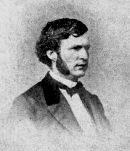
"The Private History of a Campaign that Failed" is one of Mark Twain's sketches (1885), a short, highly fictionalized memoir of his two-week stint in the pro-Confederate Missouri State Guard. [1] It takes place in Marion County, Missouri, and is about a group of inexperienced militiamen, the Marion Rangers, who end up killing a stranger in panic. In 1887, he claimed before Union veterans that he had been in one battle in which a stranger had been killed in the summer of 1861. [2] In fact, Twain saw no action; he quipped that during his service he spent more time retreating while being hunted than fighting. [3] [4]